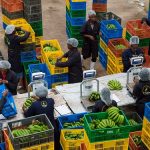TechInAfrica – According to Alliance for a Green Revolution in Africa, female subsistence farmers consists of more than 70% of African farmers. USAID last week announced an investment of $70 million into research for new seeds and methods to eliminate the bad impacts of droughts and disease on crops in the developing countries. The announcement was made by USAID Administrator, Mark Green, at the 2019 Borlaug Dialog International Symposium.
Experts in the agriculture sector breakthroughs new solutions using technology to address some challenging problems facing African farmers, including hunger, food price hikes, and drought which have become continent-wide problems.
The 2019 Borlaug Dialogue International Symposium is a gathering of nutritionists held annually in Des Moines, Iowa, the United States. At this gathering, experts have their expectations of a new generation called Agro-Entrepreneurs in Africa.

Mark Green said, “Humanitarian assistance, including food assistance, is treatment, not cure. We must develop new technologies and partnerships that will not only assist displaced families in crisis settings but offer them livelihood opportunities wherever they can find them.”
The three-day event held on Friday, bringing together 1,200 experts, policy chiefs, executives, and farmers for more than 65 countries discussing how to tackle food scarcity and price hikes, which particularly disadvantage Sub-Saharan African farmers.
According to Jennifer Blanke, Vice President for Agriculture, Human, and Social Development at the African Development Bank (AfDB), Africa had missed out on the green revolution that hit Asia and Latin America during the 1950s and 1960s. However, through the new technologies that are emerging, African farmers and policymakers are now able to get back on track and boost harvests.
Blanke said, “You can do so many things with technology. With drones, you can survey your fields in a minute, which would have taken hours and hours previously. You can spray pesticides. Satellite technology allows you to see what’s happening to weather systems. Basic mobile technology helps farmers in rural areas know what prices they can get for their food.”
Source: Africa.com
 We just launched our WhatsApp channel. Want to get the latest news from the Tech in Africa?
We just launched our WhatsApp channel. Want to get the latest news from the Tech in Africa?


